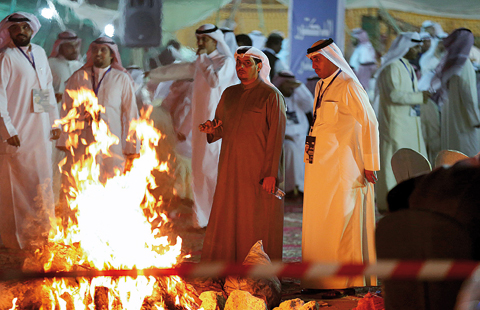 KUWAIT: Kuwaitis attend an election campaign meeting for the upcoming parliamentary election, in Kuwait City, late on November 23, 2016. A total of 287 candidates, including 14 women, have registered to stand for election to the 50-seat parliament tomorrow. —AFP
KUWAIT: Kuwaitis attend an election campaign meeting for the upcoming parliamentary election, in Kuwait City, late on November 23, 2016. A total of 287 candidates, including 14 women, have registered to stand for election to the 50-seat parliament tomorrow. —AFPKUWAIT: The oil-rich Gulf state of Kuwait, which holds parliamentary elections tomorrow, has been ruled by the Al-Sabah family for two and a half centuries. Here are five facts about the country of 4.4 million people, who include 3.1million foreigners:
An active political scene
Kuwait was the first Gulf Arab state to adopt a parliamentary system in 1962. The constitution provides for a 50-member National Assembly, elected for four years. While parliament enjoys legislative and monitoring powers, the government is formed from unelected MPs and is headed by a senior member of the Al-Sabah family, with the Amir, Crown Prince and Prime Minister all senior family members. Political parties are banned under Kuwaiti law but many Islamist, nationalist and liberal groups operate freely as de facto parties. From mid-2006 to 2013 the country went through a period of political turmoil, due to disputes between lawmakers, mainly from the opposition, and the government.
New elections
Amir Sheikh Sabah Al-Ahmad Al-Sabah, 87, in power since January 2006, dissolved parliament in October - a year before its term was to expire, amid a dispute over petrol price hikes. The November 26 election sees the return of major opposition groups and individuals, ending a four-year boycott in protest against the government for amending the voting system.
Oil, OPEC
A member of the Organization of Petroleum Exporting Countries (OPEC), Kuwait pumps about 3.0 million barrels per day and sits on seven percent of the world's proven crude reserves. Before crude prices began to slide in mid-2014, Kuwait earned around 95 percent of its income from oil and gas. But the country's oil revenues dropped from a massive $97 billion in 2013-2014 to $40 billion last fiscal year, according to finance ministry figures.
Rich monarchy with deficit
The emirate of 17,818 square kilometers (6,880 square miles) has a high standard of living with per capita income of $28,500 in 2015, according to the International Monetary Fund. It has provided a generous cradle-to-grave welfare system to its 1.3 million nationals. Kuwait quickly recovered from the 1990 invasion by neighboring Iraq, which led to a US-led operation to expel the Iraqi forces in February 1991. However, in 2015-2016, it posted its first budget deficit of $15 billion after 16 years of surpluses, due to the fall in crude prices. During its previous surpluses, Kuwait amassed reserves worth $600 billion invested mostly abroad. Kuwait has responded by raising power and water charges and hiking petrol prices.
Security concerns
On June 26, 2015, an Islamic State group suicide bomber struck a Shiite mosque in the capital during Friday prayers, killing 26 people in the worst ever attack in Kuwait. Deteriorating relations between Iran and the Gulf Arab states have also affected Kuwaiti Shiites, who account for 30 percent of the native-born population. The minority reacted angrily in January 2016 when two Shiites-a Kuwaiti and an Iranian-were sentenced to death for spying for Iran and Lebanon's Shiite group Hezbollah. In January, Kuwait recalled its ambassador to Tehran after relations were broken off between Saudi Arabia and Iran._ AFP










